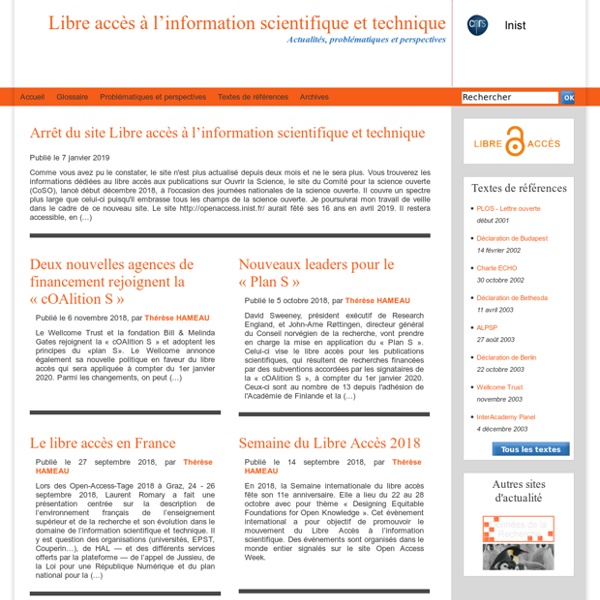



Data Theft: Hackers Attack We are constantly warned to protect our passwords, Social Security numbers and other “personal identifying information” to thwart thieves who may steal laptops or perpetrate online fraud. Although such breaches have soared since 2005 (right) as criminals try to commit identity theft, the truly enormous breaches (bottom) have increasingly been carried out by “hacktivists”—individuals or groups who are angry about an organization’s actions. Hackers, for example, exposed data about 77 million Sony customers after the company pursued legal action against other hackers. “More than 107 million people were affected by hacking during the first half of 2011,” says Jake Kouns, CEO of the Open Security Foundation in Glen Allen, Va., which runs the DataLossDB project (the data source for graphics on this page). Will you be informed if your data are exposed? Maybe not.
Accueil Welcome to our PEER Partner repository hosted by HAL - CCSD, CNRS PEER (Publishing and the Ecology of European Research), supported by the EC eContentplus programme, will investigate the effects of the large-scale, systematic depositing of authors' final peer-reviewed manuscripts (so called Green Open Access or stage-two research output) on reader access, author visibility, and journal viability, as well as on the broader ecology of European research. The project is a collaboration between publishers, repositories and researchers and will last from 2008 to 2012. PEER repositories: RSS Search Engine - Find Feeds with Instant Search Instant RSS Search engine will help you discover RSS feeds on the web around your favorite topics. You may use the tool to search RSS feeds for blogs, news websites, podcasts and more. It is instant search and hence the search results display as you type. You may use any of the Google search operators - like allintitle, inurl, etc. - for more accurate results.
OpenCourseWare History[edit] The OpenCourseWare movement started in 1999 when the University of Tübingen in Germany published videos of lectures online for its timms initiative (Tübinger Internet Multimedia Server).[1] The OCW movement only took off, however, with the launch of MIT OpenCourseWare at the Massachusetts Institute of Technology (MIT) and the Open Learning Initiative at Carnegie Mellon University[2] in October 2002. The movement was soon reinforced by the launch of similar projects at Yale, the University of Michigan, and the University of California Berkeley. MIT's reasoning behind OCW was to "enhance human learning worldwide by the availability of a web of knowledge".[3] MIT also stated that it would allow students (including, but not limited to its own) to become better prepared for classes so that they may be more engaged during a class. Since then, a number of universities have created OCW, some of which have been funded by the William and Flora Hewlett Foundation.[3] Principles[edit]
The Use of Pastebin Pastebin is a popular website for storing and sharing text. Though it’s mostly used for distributing legitimate data, it seems to be frequently used as a public repository of stolen information, such as network configuration details and authentication records. Various hacker groups and individuals seem to be using Pastebin to distribute their loot; the highest-profile publisher in the recent weeks was LulzSec. What’s Popular on Pastebin To get a taste for the kind of information available on Pastebin, take a look at its Trending Pastes page. The most popular pages at this moment include gems such as:
MATH I give these away for free. All I ask is that you print them in color. There are six JPEG files; each fits on a standard piece of 8.5"x11" paper. Print them out on a color printer, laminate them if possible, then cut them up and use them. HBGary leaked emails Type: Other > Other Files: Anonymous vs. HBGary: the aftermath The RSA security conference took place February 14-18 in San Francisco, and malware response company HBGary planned on a big announcement. The firm was about to unveil a new appliance called "Razor," a specialized computer plugged into corporate networks that could scan company computers for viruses, rootkits, and custom malware—even malicious code that had never been seen before. Razor "captures all executable code within the Windows operating system and running programs that can be found in physical memory," said HBGary, and it then "'detonates' these captured files within a virtual machine and performs extremely low level tracing of all instructions."
Publishing Open Government Data Abstract Every day, governments and government agencies publish more data on the Internet. Sharing this data enables greater transparency; delivers more efficient public services; and encourages greater public and commercial use and re-use of government information.